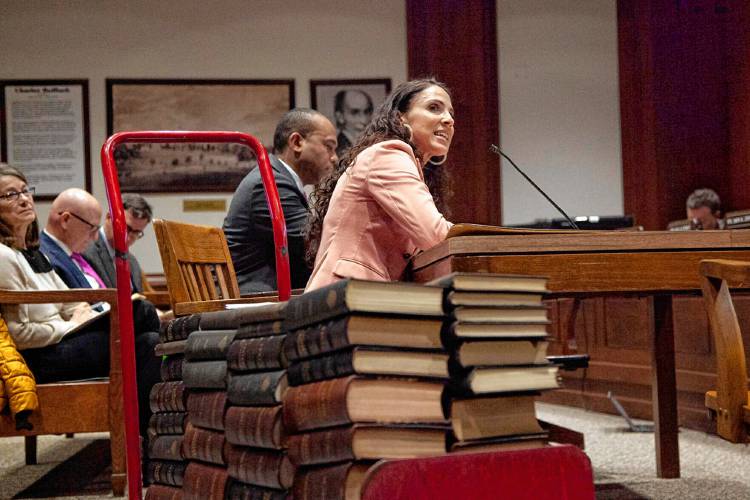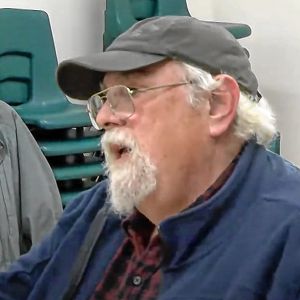Researchers: Even if Question 1 passes in November, auditor’s power to examine Legislature will be limited

Auditor Diana DiZoglio addresses lawmakers March 26, flanked by a books she wheeled into the hearing room containing what she described as previous audits her office conducted. SHNS
| Published: 09-03-2024 5:27 PM |
BOSTON – Supporters of a ballot measure going before voters this fall say granting the state auditor the ability to investigate the Legislature would increase transparency and accountability for a body that they say is opaque. But a new study says that even if the question passes, the auditor will be limited in how much of the Legislature’s workings she can actually examine.
After being rebuffed by lawmakers in her audit attempts, State Auditor Diana DiZoglio is leading the public push for the measure, which will appear as Question 1 on voters’ ballots. The initiative asks voters whether the auditor should be allowed to investigate the Legislature and evaluate at least some of its activities – an idea largely opposed by the Democrat-led House and Senate.
The Tufts’ Center for State Policy and Analysis, which conducts research on ballot questions ahead of elections, wrote in a report released Tuesday that some legislative activities are off-limits to executive interference. The auditor’s office is technically under the executive branch in the state constitution.
“Votes, debates, committee assignments, policy priorities – these are all ‘core legislative functions’ that the Massachusetts auditor will not be able to examine even if Question 1 passes,” the report says.
Supporters of the measure say it will increase transparency on Beacon Hill, where some of the most important legislative decisions happen behind closed doors and committees often do not release information about how individual lawmakers vote on bills.
The question so far seems to be overwhelmingly popular among prospective voters. An Emerson Polling Group survey on behalf of the Pioneer Institute released last week showed an 80-6 margin of support to expand the auditor’s powers.
The Tufts report says the question’s approval may allow the auditor to look into compliance with employee training rules, cybersecurity norms and purchasing practices within the Legislature.
“While auditors in other states occasionally investigate such non-core activities, they rely on cooperation from legislators. Looking around the country, we could not find any examples of legislative audits conducted without lawmakers’ consent,” it says.
Article continues after...
Yesterday's Most Read Articles
 Long-vacant former Faces spot in Northampton gets new tenant
Long-vacant former Faces spot in Northampton gets new tenant
 Here come the sweetness: Four new businesses prepping to open in downtown Northampton
Here come the sweetness: Four new businesses prepping to open in downtown Northampton
 Local ‘Hands Off!’ standouts planned as part of national effort
Local ‘Hands Off!’ standouts planned as part of national effort
 Area property deed transfers, April 4
Area property deed transfers, April 4
 Hatfield Select Board removes elected Housing Authority member
Hatfield Select Board removes elected Housing Authority member
 Shutesbury reviewing how to improve safety on Lake Wyola in wake of accident last summer
Shutesbury reviewing how to improve safety on Lake Wyola in wake of accident last summer
It continues, “Even if Question 1 passes, legislators will have a lot of leverage to resist investigations. They might drag their feet, refuse to comply, or use their budgetary power to handcuff or even defund the auditor’s office. If that happens, the fight may shift to the courts, where the outcome is hard to predict.”
Powerful lawmakers have made their opposition to DiZoglio’s efforts well-known, though House Speaker Ron Mariano and Senate President Karen Spilka told Commonwealth Beacon last week that they wouldn’t run opposition campaigns against the question.
Mariano has previously said DiZoglio’s attempt to audit the body “violates basic separation of powers principles that the Supreme Judicial Court has called ‘fundamental... to our form of government.’ ”
Spilka has also cited the separation of powers when asked about the ballot question.
“There is a fundamental constitutional reason the auditor can’t necessarily audit the legislature, namely the separation of powers,” the Tufts analysis published Tuesday says. “Core legislative activities, like establishing committees and voting on bills, are understood to be the unique prerogative of the legislature.”
Though researchers reference Article XXX of the state constitution, which states that the executive branch does not reach into legislative powers, they add that “there are other reasons that the legislature’s assertions of privilege have grown increasingly unconvincing to many Massachusetts voters.”
It cites examples: The Legislature is exempt from public records requests; votes that committees make to kill or advance a bill are not consistently shared; amendments to omnibus bills are mostly eliminated or altered behind closed doors in private meetings; and major legislation often passes late in the night, with limited debate, using voice votes that leave no record of members’ opinions.
“To be clear, these sorts of issues are unlikely to be affected by Question 1, as they involve core legislative functions. But the current auditor, herself a former legislator and the chief sponsor of Question 1, also cites instances where the legislature may have failed to follow its own established rules – like providing required staff training – and where an audit might be feasible,” it says.
Lawmakers have countered DiZoglio’s efforts in part by asserting that they already undergo their own audits, conducted annually by the private firm CliftonLarsonAllen. These audits typically include an overview of how the legislative process works in Massachusetts and financial statements on budgetary accounts, but do not have line item breakdowns of spending.
Tufts researchers outline possible actions that could follow the election if Question 1 passes: it could move to the courts if the Legislature challenges the audit, lawmakers could pass a bill overturning Question 1 and clarifying the auditor’s authority, or lawmakers could cut funding to the auditor’s office or attach spending strings, specifying that money can’t be used for legislative audits.
“One precedent for legislative defiance would be the ‘clean elections’ ballot initiative in 1998, which was supposed to provide public funding for state elections. Though this initiative was endorsed by voters, it was opposed by many incumbent lawmakers, who defied pressure from the governor and the courts, consistently underfunded the effort, and then repealed it in 2003,” the report says.
The report takes no position on Question 1. Future reports will analyze the four other questions going before voters this fall.






 A father’s dream to be the best: Twelve men graduate from Nurturing Fathers program
A father’s dream to be the best: Twelve men graduate from Nurturing Fathers program McGovern co-sponsors bill that aims to stop ‘backdoor’ cuts to SNAP benefits
McGovern co-sponsors bill that aims to stop ‘backdoor’ cuts to SNAP benefits Final interviews set for Granby school superintendent candidates
Final interviews set for Granby school superintendent candidates
